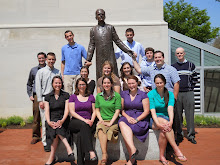Monday, January 26, 2015
Why does the annulment process take so long?
In my previous
article, I wrote about the process of
determining a marriage valid or invalid as a means through which the Church
demonstrates mercy and justice. Unfortunately, we live in culture with
disposable mentality. There seems to be a need to have quick fixes in the form
of no-fault divorces (or any divorces in general). The desired celerity of resolutions
only results in the same mistakes occurring again and again; it buries the
burdens and further damages the spouses. While the slow pace of the case is
necessary to determine the invalidity or validity of the marriage, it can also
provide time the couples need to grow from the experience and better understand
their discernment of marriage.
As a canonist, I seek moral certitude, which is accomplished
by instructing the case, that is, by determining motives and gathering evidence
about the validity or invalidity of the bond of a marriage. I investigate the history of each of the
spouses and their background as a couple, and most importantly, there is a
discernment of the details that led them to pronounce a vow of marriage in the
first place.
 |
| Public domain |
I emphasize to couples that the process is lengthy and
focuses primarily on the beginning and not the end of their relationship/marriage.
Though the ending of the relationship does not often apply to the
investigation, the parties tend to be concerned with it, blaming the one
another for it. While strong emotions can help me fish out the truth during
interviews, my focus is on the beginning and the marriage/relationship itself;
it is not a judgment of the persons.
Canonists—or any other tribunal officials—are neither
spiritual directors, therapists, nor any sort of healing ministers, but the
annulment process unveils elements of the spouses’ characters, psychologies, and
personalities, sometimes revealing what has influenced their decision making and
resulting mistakes. Every process begins when one of the spouses (the
petitioner) requests to have their marriage investigated. In turn, the other
spouse (the respondent) shares the same rights as the petitioner. Some
petitioners are stuck and can't seem to see past the end of the relationship;
they want the annulment process to go by quickly so they can forget their
problems. Again, we see evidence here of our quick-fix culture. On the other
hand, there are others who see the process as a means to grow and prepare, if
called, to marry again. I don’t encourage or recommend how a couple should
approach the process, I can only pray to God and His Holy Spirit to lead me to
moral certitude as I instruct each case.
As the case nears the end, all the evidence is gathered (the
publication of the acts) and both spouses can read the facts of their case.
During this stage of the case, the couple is made aware of the evidence that
the judge will evaluate and given the opportunity to provide feedback. They may
read harsh details that they would rather avoid or simply forget, but this
opportunity should also serve as a reminder that God is the healer and He loves
us through it all.
When the final decision is reached and a vetitum (condition
that needs to be met before the couple can marry in the Church again) given, it
provides a level of aid as the spouses discuss their previous relationship with
a counselor, psychologist, or cleric as determined by a judge according to the
vetitum. For the canonist, the vetitum is placed not to hinder a new marriage
but in the hope that next marriage will be according to the teachings of the
church.
Some individuals take the decision with a grain of salt and
move on to their next marriage quickly (unless a vetitum is required). But from
time to time, it is pleasant to witness individuals who go through the lengthy
process with some sense of discernment or authentic growth. Yes, the process is
slow, but it provides time for discernment and understanding of the mistakes
made, in hopes for amendments and a clearer understanding of the fullest sense
of a vow—that the couple is no longer two, but one flesh. The annulment process
is therefore, no matter what the result, a continuation of the Church upholding
what she has always known: that what God has joined together, no human being
must separate.” (NABRE Mat. 19:6)
Have a question you’d like answered about canonical law? You
can email it directly to askacanonlawyer[at]gmail.com
Subscribe to:
Post Comments
(
Atom
)
















No comments :
Post a Comment
We would love to hear from you! Please keep comments respectful and relevant to the topic at hand.